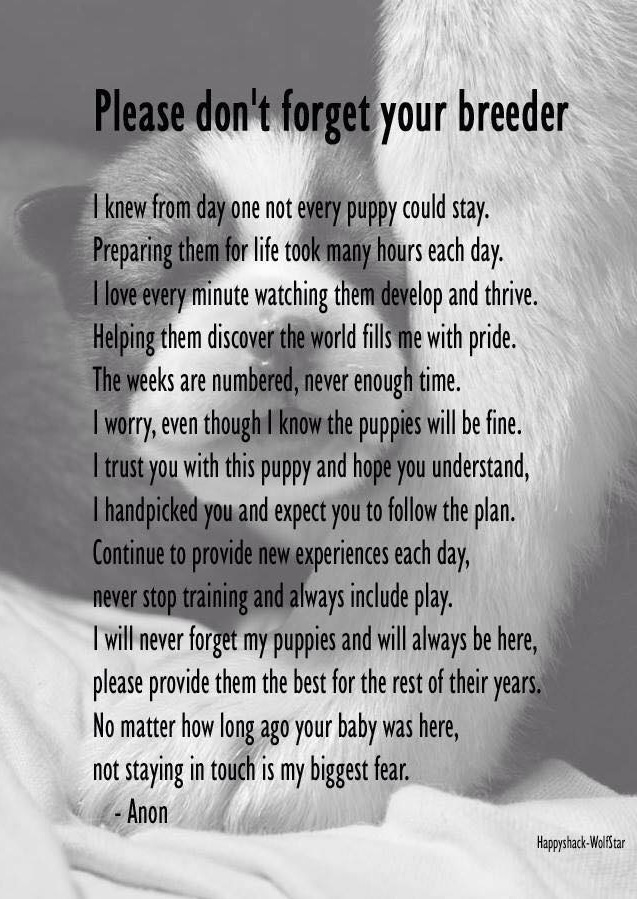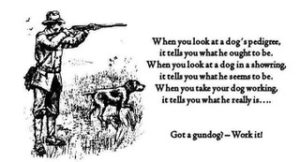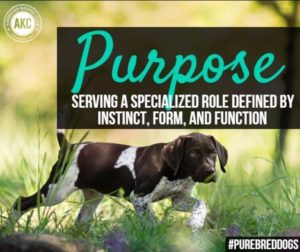Why Breed for Ability?
By Karen Fremuth
Edit and update January 20, 2021
There is an old saying….”If you don’t breed for it, you are breeding against it”.
Put another way, if you do not select to maintain or improve particular traits you will lose them.
I have often heard the argument to the affect of “Just because our Spaniels haven’t done field work or obedience doesn’t mean that the breed is not able to DO the work it was originally bred for. We just choose not to work them.”
Wouldn’t it be nice if that were true. But if it were true, then show-breds would not have ever earned the reputation for weak ability. That is what happens when show breeders claim “the great grandsire was a hunter and the dam chases yard birds so these pups will hunt” and they pass off their non-show quality progeny to unknowing buyers seeking hunting companions. Buying a hunting companion from show lines this way is, frankly, a crapshoot, albeit more so in some breeds than others. Breeders who prove their stock afield, choose to improve on the necessary traits for hunting and know how to select hunting prospects from a litter are a better bet for a reliable hunting companion.
If it helps to use the example of show breeding to see the point, what would happen if you didn’t breed for body type and structure? What if you bred only to/for dogs that had nice heads and ignored the rest of the dog? What if you never tested for health problems and just bred to whatever looked good?
What if you bred ONLY for ability and not for structure/type at all? How about this justification? “Just because I don’t breed for pretty heads and good conformation doesn’t mean my dogs can’t win in a dog show, just that I CHOOSE not to show them”. See how ridiculous this sounds?
Yes, it is true that there are a lot of show-bred dogs that have retained good hunting ability – indeed that we frequently line-breed insures that some entire lines will retain ability assuming the stuff being repeated in the pedigree is strong. But correspondingly, if the core of a line breeding program lacks ability, so will the bulk of what the line produces. We do the breed a disservice when we make assumptions one way or the other based on the success or failure of any one dog or line within a breed. The only way to know for sure is to actually work the dogs.
I’ll also add that inherent hunting ability amounts to much more than just birdiness. It breaks down to many different inherited components, some of which include:
-Birdiness (obsessed with birds)
-Desire to please/Biddability (anxious to participate and wants to please)
-Range (works fairly close but not underfoot nor takes off. Within gunrange)
-Nose (good scenting ability and knows how to use it)
-Intelligence (ability to work out problems, includes memory)
-Independence (will take initiative, does not need direction for every move)
-Persistence/tenacity (aka “Heart”)
-Boldness to game (does not hesitate on the flush or avoid birds)
-Boldness to cover (enthusiastically enters into cover)
-Boldness to water (enthusiastically enters into water)
-Boldness to sound (does not cower/run from gunshots)
-High pain threshold (allows for a dog that will not balk in thorny cover or cold water)
-Mouth (handles game gently but firmly)
-Retrieve desire (likes to carry and bring to owner)
-Marking ability (alert, good vision and depth perception)
-Chase instinct
-Focus (will maintain concentration on the task and not be drawn away by distraction)
-Optimism
-Enthusiasm/drive
Also, consider proper structure for the job— balanced fore and aft and properly proportioned for the required task, good chest and ribs, bone and muscling, strong, level top line, tight, thick feet, tight eyes, correct ear set (not too low), adequate muzzle and moderate coat. The finer points of head type, expression, markings, and other superficial concerns should not take precedent over actual necessary working structure.
Yes, quite a few of the skills and abilities can be trained in. But if a dog inherits only a few of these traits, is that a dog we really want to train, hunt with, and breed under the description of “hunting dog”? I have a friend who hunts with Border Collies – they are naturally “birdy”, biddable, outgoing, and intelligent. The rest she had to train for. She trained them to seek out bird scent and to flush and retrieve and they do a serviceable job, albeit not at all comparable to what my Cockers can do. Does that mean Border Collies are “hunting dogs” and should be bred and promoted as such?
The inherent hunting abilities and necessary character is what gives the Spaniel that delightful personality that makes them such fun and wonderful pets and is what buyers of Spaniels for hunting *expect*. Otherwise, why not just pick up a mutt at the pound and train the begeebers out of it? Why bother with purebreds at all?
A Spaniel is the great companion it is because of the skills and working character it was bred to have. If we drop out too many of these traits, either on purpose or by neglect, we could well lose the very character of our dogs. We all know Spaniels that are indifferent to game, lack natural retrieve drive, are stubborn, dominant, give up easily, skittish to noise, hate water, scatterbrained, clingy, or conversely, “take off for the next county”, slow to learn, or lacking in self-confidence. This is what we get in our failure to select for working traits.
How can you select for the correct traits when you don’t give your breeding stock the chance to prove they have them?
We owe it to the breed and the developers of the breed to preserve the whole dog, not just our preferred facet.



